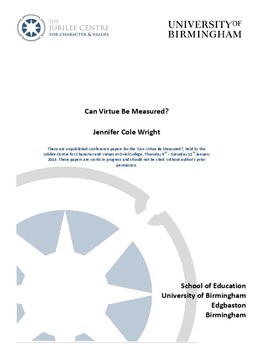| dc.description.abstract | In addressing this question, I will define “virtue” as the possession of (a set of) virtue-relevant traits (e.g., honesty, compassion, bravery, generosity, etc.) – “traits” being defined as trait-appropriate cognitive/affective/behavioral responses that are consistently triggered by trait-relevant stimuli in the person’s environment – along with the chronic accessibility of trait-oriented values/goals and trait-relevant identity attributes. Given this account, I explain in this paper how the empirical study of virtue involves the measurement of four things: (1) people’s sensitivity to the presence of (external/internal) trait-relevant stimuli; (2) people’s recognition/generation of trait-appropriate (cognitive/affective/behavioral) responses; (3) the dispositionality of the connection between 1 and 2; and (4) the chronic accessibility of trait-oriented values/goals and trait-relevant identity. The first can be operationalized as people’s ability to perceive (visual/auditory), identify, and generate trait-relevant stimuli; the second, as people’s recognition of both self and other trait-appropriate cognitive/affective/behavioral responses, in naturalistic and artificial/controlled environments – as well as their live/spontaneous generation of the same. “Dispositionality” can be operationally defined along two dimensions: consistency and habituality. Finally, chronic accessibility of trait-oriented values/goals can be operationally defined as people’s explicit/implicit identification of trait-oriented values/goals as important. - See more at: http://www.jubileecentre.ac.uk/474/library#sthash.3FAg81SV.dpuf | en_US |
